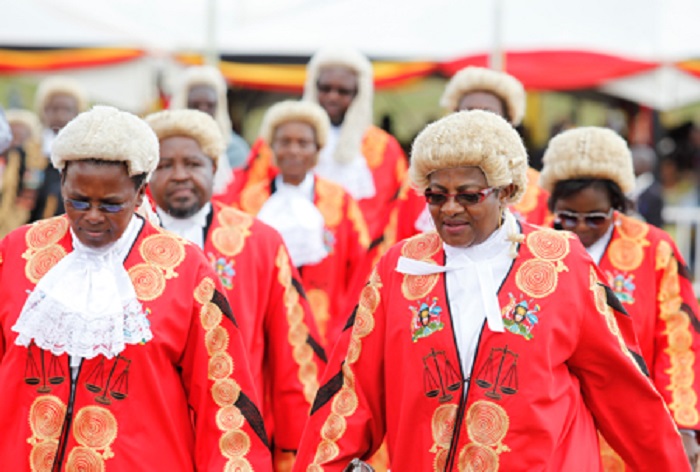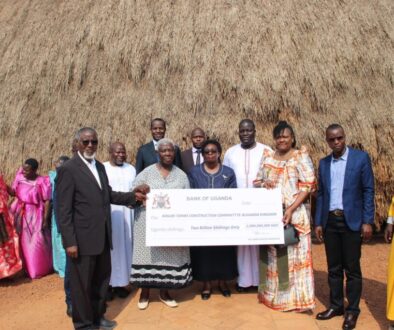Judiciary engage cultural and religious leaders

CAPTION: Ugandan judges at a function recently. (File photo)
The judiciary has started meeting traditional, cultural, and religious leaders as part of efforts to formalise and strengthen local justice systems, with the goal of integrating long-established community dispute resolution methods into the broader legal framework.
The move comes as judiciary officials acknowledge the crucial role the community-based means described as the Alternative Justice System (AJS) play in delivering justice, especially in rural and underserved communities.
“It is no longer tenable to ignore what is already happening on the ground,” said Justice Khaukha. “Studies have shown that our communities already use effective and trusted mechanisms to resolve disputes. Formalizing and supporting these systems will ensure they become more structured, accessible, and fair to all citizens.”
Khaukha made the remarks at the opening of a national summit that has brought together traditional leaders, elders, and religious figures from across the country to discuss how best to formalize the system.
Recent surveys and internal reports from the judiciary reveal that nearly 90% of disputes in Ugandan communities are resolved through local or traditional mechanisms, with formal courts handling only about 10% or less. This reality has prompted a renewed focus on AJS as a viable complement to what is known as the formal justice system.
Justice Khaukha emphasized that “if all disputes ended up in court, the system would collapse under the weight of unresolved cases,” citing over 167,000 cases pending in a system with insufficient judicial personnel. This reality has driven the push to institutionalize the community mechanisms that already resolve most disputes, ranging from land and inheritance to family and marriage issues, under AJS structures.
As Khaukha noted, “The burden of proving who did what in court often leads to further trauma, while community justice promotes healing, reconciliation, and social harmony.”
Since 2023, the judiciary has been working on a policy and strategy, anchored in Article 126 of the Constitution, to promote people-centered justice. It now aims to formalize community-based systems and integrate them with the formal judiciary. However, Professor Khaukha noted challenges remain, including capacity building, oversight, documentation, and rights protection.
“The question isn’t whether AJS should exist, but how it should be supported, regulated, and aligned with the Constitution,” he said.
Chief Justice speaks out
Chief Justice Alfonse Owiny-Dollo said traditional justice systems were dismantled and demonized by colonialists, who imposed a foreign, complex system that remains inaccessible to many, despite justice being meant for the people.
The Chief Justice added that these systems effectively handle disputes ranging from household conflicts to serious cases like murder. A strong supporter of AJS, he said the formal system remains costly, distant, and complicated for ordinary citizens, even with efforts to decentralise courts.
The Chief Justice also acknowledged that the road ahead involves defining clear boundaries, especially in criminal matters, and ensuring a fair, enforceable structure. But the direction is set. “This is the beginning of a judiciary that listens to its people,” he said. “Justice must not only be done, it must be understood and trusted by the communities it serves.”
He added that judicial officers will soon be encouraged to advise court users to first seek resolution through local justice systems before bringing their cases to formal courts.
Nobert Mao, Justice and Constitutional Affairs Minister ,also endorsed the initiative, pointing out that thousands of court cases, especially land disputes, remain unresolved for years, locking up property and financial resources. To him, AJS can offer timely resolutions, restore community harmony, and decongest the formal court system.
Participants at the forum expressed optimism that with the right policy and legislative backing, AJS can transform access to justice across Uganda, especially for the rural majority who often find the formal system expensive, intimidating, and out of reach.
Rwot Collins Muttu Akiko II, Patiko Chiefdom traditional leader, emphasised cultural integrity: “Our people understand and trust these systems. Courts often don’t grasp the complexities of our customs, and their judgments sometimes cause community unrest.” Canon Richard Ogwang Odyero, the Awitong (Clan head) of Ogora, added that formal systems often alienate locals. “Courts are bringing more trouble than before. Let us return to what has always worked.”
Uganda is not alone in turning to AJS for improved justice delivery. In Kenya, the system is gaining ground, while Namibia has gone a step further. Under Namibia’s Traditional Authorities Act, community courts handle family and land disputes and are integrated into the state system.


